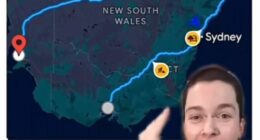
Ending a four-month tangle of negotiations, and to Palm Coast’s immense relief, the Flagler Beach City Commission on Thursday approved a deal with an Atlanta-based DC Blox, a data-service company, that will allow it to use city rights-of-way to land undersea internet cables for $600,000, with a potential for up to an additional $750,000. There would be no subsequent payments.
The commission voted 4-1 to approve the deal with DC Blox, which is building a so-called cable landing station, or CLS, in Palm Coast, similar to one it built in Myrtle Beach, S.C., for up to six of the sort of undersea cables that form the backbone of the global internet. The deal protects all city assets from encroachment.
The deal is not absolutely final. DC Blox’s board must ratify it, and the final engineering plans must yet go before the City Commission to ensure that last-minute restrictions it is requiring are complied with. But based on Thursday’s concessions by both city commissioners and DC Blox officials, the deal is all but done.
DC Blox had originally offered the city $100,000 per cable, with two landing sites–one on 11th Street North and one south of the pier, either on 6th Street or at Veterans Park. The city objected both to the low offer and to the Veterans Park location, which would have prevented the city from using close to a third of the park in perpetuity.
DC Blox dropped the 11th Street option and agreed to limiting its cable locations to the right-of-way on South 6th Street, after initially hoping to use the city-owned parking lot there. But that would have prevented the city from developing the lot in the future, and city commissioners were not willing to let that happen.
Though Flagler Beach successfully doubled the price DC Blox will pay foreach cable, and more than doubled it for its last three cables, the company is likely to make back some if not all of the money, at taxpayers’ expense, through an economic-development deal it is benefiting from through the data center it plans to build in Palm Coast’s Town Center. Palm Coast and Flagler County have kept that deal secret, as has DC Blox, whose officials, after several intercessions by Palm Coast officials, have declined to speak with FlaglerLive.
City, county and company officials put immense pressure on Flagler Beach officials over the last several months to agree to a deal, describing the data center in Palm Coast as contingent on a successful negotiation in Flagler Beach. Neither the city commission nor City Manager Dale Martin appeared willing to buckle, however, before conducting their own analysis. Martin retained a consultant, Michael Tammaro, an attorney who had negotiated similar deals in the past, who then helped the city negotiate further with DC Blox. Martin has just barely marked his first anniversary as manager. The deal will figure as a significant capstone to that first year.
There were negotiating strains until the very end, and it wasn’t a given that the commission and DC Blox would agree to a deal Thursday, as a new sticking point emerged: the city wanted $800,000 up front, regardless of the number of cables the company landed, and an additional $200,000 per cable landed after the first three, to be paid as each cable was landed. DC Blox found the up-front proposal too steep. DC Blox was not willing to go beyond the $600,000 up front.
“We just reached a point where we felt like we had offered what we could offer,” Chris Gatch, the company’s sales director, said. “We did revise our offer yesterday to increase the total potential payout under the easement to $1.3 5 million, but based the last portion of that being success based on the last three cables.”
Betraying at least some lingering frustration, Gatch still portrayed the city’s position as somewhat unreasonable, based on the value of the right of way his company was using. “The idea that there’s a fair market value for our easements that aren’t tied to our businesses just doesn’t hold water,” he said. “The only way anybody like us will be willing to pay $1.2 million to pass under a $7,300 piece of property is because our business plan depends on it and finds a way to make sense of that.” Gatch also sharply disputed Tammaro’s premises, saying they were based on deals almost a quarter century old, not on current market condition, and that South Florida had lost out on companies like his because “Florida just became less competitive and and there were better alternatives farther north that weren’t as mired in challenges that South Florida was.”
His presence before the City Commission suggested otherwise.
“We felt like we came a long ways and have offered a substantial payment to the city for the easements that we’re seeking,” he said.
As City Attorney Drew Smith described it, “I think the biggest hang up is the contingency. And I think if there could be less contingency and more guaranteed money,” the city would be more amenable, even though both sides had agreed to an ultimate payment of $1.2 million, if all six cables were landed. But there is a possibility that all six cables will never be landed.
The contingency, Smith said, ” makes those dollars worthless, because until they’re in our pocket, we can’t we can’t do anything with them.” He was loloking for a way around the hangup. Commissioner Eric Cooley proposed $700,000 up front, plus $250,000 contingent on each additional cable, up to three cables. But that would have pushed the overall cost to DC Blox $1.45 million, well past the additional amount it had been willing to give.
Jeff Uphues, the company’s CEO, told the commission he wasn’t authorized to negotiate those terms in his board’s absence, though he did negotiate certain terms, such as the location of grounding beds.
Commissioner Jane Mealy wasn’t satisfied. “You could very well put in the three cables for $600 or $800 or whatever amount of money, and we never see you again,” she said. “You could say we don’t need the other three. So there’s no way that we can count on that.” She didn’t see the point of the discussion if Uphues couldn’t negotiate.
Uphues seemed taken aback by the method and openness of the of the process, and stuck to his position, describing it as “almost five times than any other ones we’ve ever done.”
Commissioner Rick Belhumeur made the motion to agree to the company’s terms, conditional on the company not using any green spaces–essentially, no spaces outside of rights of ways or areas critical to city projects–for any of the six grounding beds it will need for its six cables, if it lands six cables. Belhumeur had concerns about grounding beds at the Wickline Center, which the city may want to redevelop for a future city hall.
Belhumeur’s motion meant agreeing to $600,000 in up-front money, whether DC Blox lands one, two, three cables or none at all, then $250,000 for each additional cable it may land, with a possibility that it may land no more than three. So the least the city will make on the deal is $600,000. The most it will make is $1.35 million. The commission voted 4-1 to approve, with Mealy in dissent.
![]()
dcblox-august-22-2024






